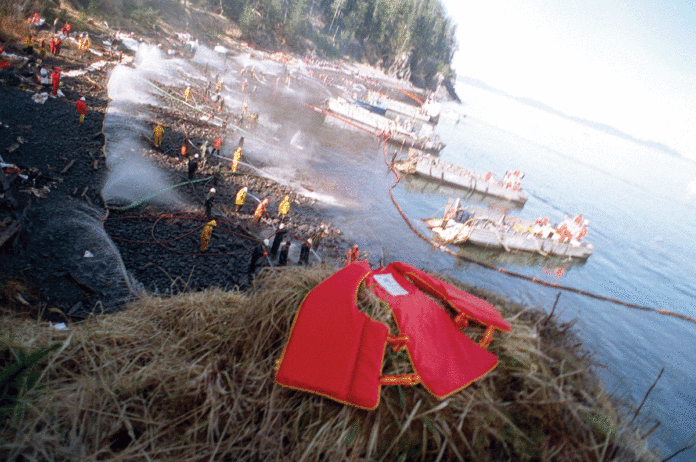
By Donna Schantz
Of all the advances made in the safe transportation of oil since the 1989 Exxon Valdez Oil Spill, perhaps the most innovative and significant was the establishment of permanent, industry-funded citizen oversight for both Cook Inlet and Prince William Sound. While the citizen advisory groups established in Alaska after the spill were modeled after the advisory committee set up for the Sullom Voe Terminal in the Shetland Islands, throughout the world, most oil development still takes place without citizen involvement. In Prince William Sound, many of the safety improvements now in place are a direct result of partnerships between industry, regulators, and citizens.
March 24, 2024, marked 35 years since the Exxon Valdez disaster. This year will also mark 34 years since the formation and incorporation of our organization, the Prince William Sound Regional Citizens’ Advisory Council. The council recently reconnected with several of our founding members to discuss why they think our organization is still relevant today, with quotes from those conversations featured in our most recent “Year In Review” report.
You can read more about their thoughts on how and why the Council was formed in our publication “Stories from a citizens’ council,” rereleased in 2023.
All of the early council board and committee members witnessed firsthand the devastating effects of the oil spill. Some of them are still volunteering for the council more than a quarter of a century later. These experiences played a big part in the passion and drive of all parties to put systems in place designed to prevent another accident, and to make sure there are adequately trained personnel, and enough equipment available, to respond immediately should prevention measures fail and another spill occurs.
Reading through the thoughts and comments from the founders reinforces the core of what the Council is and why our work matters so much.
“PWSRCAC is a powerful organization in that it really is an example of how people need to be engaged in decision making regarding development that directly impacts them.”
– Ann Rothe, 2013
“The entire process of enhancing safety is greatly benefited by having the local people who know local conditions and who care about the locality where they live take part in the decision-making process.”
– Scott Sterling, 2013
“Because the further we get away from the event, the more complacency builds. Stan Stephens often said, ‘the biggest threat isn’t another spill, it’s complacency.’”
– Bill Walker, 2023
Each anniversary of the spill, we reflect on how far we have come, as well as how much there is left to do. It is also a time to recognize the efforts of those who used the lessons of the Exxon Valdez to advocate for safeguards to ensure nothing like it ever happens again. Thanks to the foresight, vigilance, and tireless efforts of elected officials, government regulators, industry, and citizens, the oil spill prevention and response system now in place in Prince William Sound is an example to the rest of the world.
A big part of the success in Prince William Sound is that all these partners work together. We all share one goal: to promote the safe transportation of oil. While every partner has played a vital role in the success in Prince William Sound, special recognition is warranted to honor past and current technical committee and board members of the council. Our volunteers have put in countless unpaid hours dedicated to the mission of our organization, and our organization serves as a voice for Prince William Sound through our board, committee volunteers, and staff.
Everyone involved should be proud of what has been accomplished, but we also should never become so satisfied with the current services or processes that we become complacent. Constant vigilance is needed to prevent a return to the complacency that allowed that disaster to happen. Those with the most to lose from oil pollution must have a voice in the decisions that can put their livelihoods and communities at risk. We hope that the long-term partnerships the council has worked diligently to establish and maintain will help prevent backsliding, identify and mitigate risks, and promote continuous improvements designed to prevent another accident.
Donna Schantz is the executive director of the Prince William Sound Regional Citizens’ Advisory Council.
This story was originally published in the March 29 issue of The Cordova Times.














